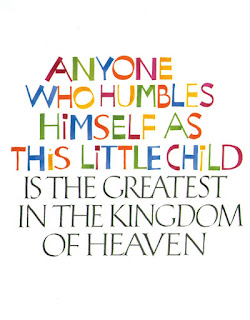Luke 9:46-50
Matthew 18:1-5
Mark 9:33-37
Point 2: As an illustration of kingdom greatness, Jesus directed them to become child-like.
"And he sat down and called the twelve. And he said to them, “If anyone would be first, he must be last of all and servant of all.” And he took a child and put him in the midst of them, and taking him in his arms, he said to them, “Whoever receives one such child in my name receives me, and whoever receives me, receives not me but him who sent me.” -Mark 9:35-37
“Truly, I say to you, unless you turn and become like children, you will never enter the kingdom of heaven." Matthew 18:3
"To illustrate servanthood Jesus set a little child from the home (cf. Mar_9:33, perhaps Peter’s child) among the disciples. To be a “servant of all” included giving attention to a child, the least (cf. “the very last,” Mar_9:35) significant person in Jewish as well as Greco-Roman society which idealized the mature adult." -BKC
Me: The phrase "unless you turn and become like children" is conditional. It's a depiction of conversion. Throughout this section, multiple commentators emphasize the strength of the language throughout this passage---it's intentionally confrontational language that leaves listeners pondering the two camps.
 "The strong double negative ou mē eiselthēte means that they will otherwise not get into the kingdom of heaven at all, let alone have big places in it." -Roberson's Word Pictures
"The strong double negative ou mē eiselthēte means that they will otherwise not get into the kingdom of heaven at all, let alone have big places in it." -Roberson's Word Pictures"But to do this was not to welcome Jesus only but also the heavenly Father who sent Him to earth. This gives dignity to the task of serving others." -BKC
On the question of child-like virtues--what exactly did Jesus mean when he suggested that we becoming "child-like"? I sifted through multiple commentaries that suggested qualities inherent to children that don't resonate. Romanticized depictions, they laud a child's "obedience to rightful authority," and "considerateness of others," "contentment in home circle,"
A few do make sense to me however--especially if I put an age cap on the child---perhaps a child under 5 makes sense? The children of our culture are aged prematurely in ways that make the comparison somewhat different. I am ignorant of how children were viewed in this Jewish culture, outside of the comment that a mature male was the top of the order.
I do think "contentment in home circle" is a characteristic of young children. They are happy to be at home, looking for a solid base from which to grow. Their world is narrow and their true needs are few.
"A child is remarkable for his persistency of trust. Children are the most logical creatures in the world. A lady asked the small daughter of the missionary Judson, “Were you not afraid to journey so far over the ocean?” And the reply was, “Why, no, madam: father prayed for us when we started!” Do a boy a real kindness, and nothing on earth can keep him from insisting to all the others that you are a kind man. Help him once, and he will keep coming with a pathetic sort of confidence that you like to help him. For one, having stumbled around a good deal in this muddle of a world, in which nobody seems to stick to anything, I am ready to say I know nothing more beautiful than the sweet forgiveness, and renewal of confidence, which a child shows when, having met a rebuff once and been turned away, it sits wondering and waiting, as if sure you would come round by and by and be good again." C.S. Robinson
To me, this feels right as the actions of the adults in our child lives have greater echoes and repercussions than at any other time in our lives. Children are vulnerable. They want to believe the best in adults. They are unable to defend themselves and ever hopeful---even and perhaps especially in abusive and unloving environments. Is it us recognizing our weakness, our need, our vulnerability that makes being "child-like" desirable? Clearly, children are not "wise" in a conventional sense. Yes, they are clean slates to write upon in many regards. Is it this "openness" that Jesus commends? Children believe the best in others even when the evidence may suggest otherwise---there is a blind trust in their spirits. Young children are without pretense.
Robinson also brings his conclusion down to a matter of conversion which also rings accurate:
"Finally, let us consider how this teaching will modify our tests of experience in grace. It is only a strange perversity which makes us seem to prefer the more subtle evidences of a change of heart. Here a plain test is proposed. The last result, the positively completed picture, of regeneration, is found in a child’s temper and disposition. Anyone ought to know whether he possesses that or not. He can find out. His life will answer his questions, when possibly he cannot exactly find out about so mysterious a thing as his heart. Nobody is going to be excluded from heaven because he cannot find out his election or his regeneration, if he is holy, and truly believes in Christ, “as this little child.” -C. S. Robinson
Whatever mental gymnastics our minds must exercise, in the end, it's the heart that must make the decision to follow Christ, to believe or not.
"Whatever seeds of evil may lurk in their minds, it is almost impossible that they should imagine themselves equal to those who are grown up. They are almost unavoidably sensible of their inferiority and dependence. And this is the state of mind towards God, to which we, as sinners, must be brought. Let us not think more highly of ourselves than we ought to think; but let us think soberly." J. Foote


No comments:
Post a Comment